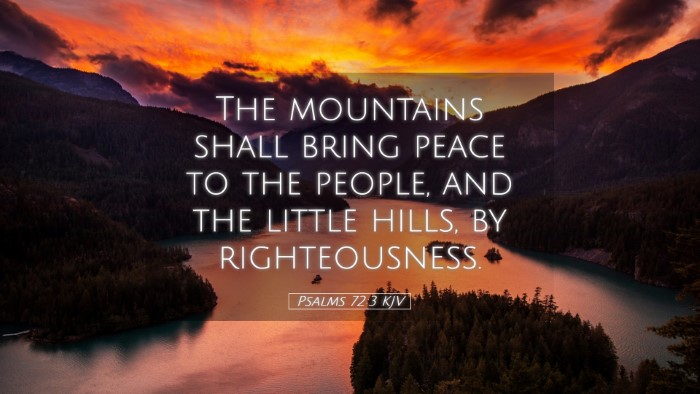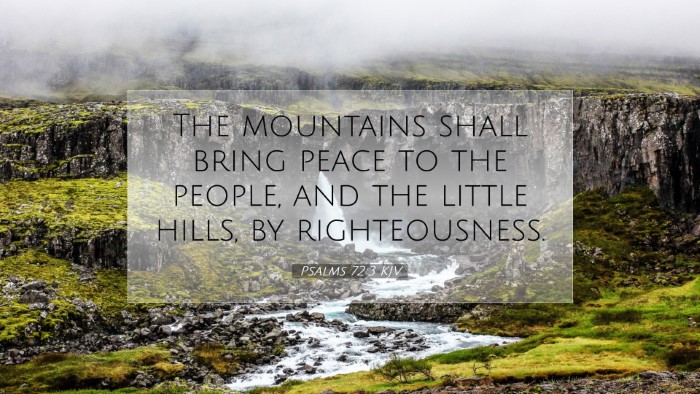Psalms 72:3 Commentary
"The mountains shall bring peace to the people, and the little hills, by righteousness." (Psalms 72:3)
Introduction
Psalms 72 is a royal psalm, reflecting a prayer or song for the king, believed to be authored by David and intended for Solomon. This psalm not only highlights the desired qualities of a righteous king but also exemplifies the anticipated effects of such governance on the land and its people. Verse 3 stands out, encapsulating the essence of peace and righteousness, which are paramount to any prosperous reign.
Thematic Elements
- Symbolism of Mountains: The "mountains" in this verse are often interpreted as symbols of stability, strength, and immovable nature. They represent the enduring principles of righteousness that should characterize the reign of a just king.
- Peace as a Result of Righteousness: The connection between peace and righteousness is a recurring theme in Scripture. This verse highlights that true peace can only be established when there is a foundation of justice and moral integrity.
- The Role of Leadership: The psalm underscores the transformative power of godly leadership. With a ruler who embodies righteousness, the land itself is inspired towards peace.
Exegesis and Commentary
Matthew Henry's Commentary:
Matthew Henry emphasizes that this verse signifies the desire for the peace, prosperity, and righteousness that ought to be present in the kingdom. He notes the duality of "mountains" and "little hills," suggesting that both great and minor authorities should abide by righteousness. Peace, as a fruit of righteousness, is not merely the absence of conflict, but a thriving state of harmony and well-being that springs forth from just governance.
Albert Barnes' Notes:
Barnes elaborates on the metaphor of mountains bringing peace, suggesting that they represent the strong and stable foundation upon which a righteous society is built. He points out that the Hebrew word for "peace" (שלום, shalom) implies completeness and fulfillment, indicating that a righteous reign results in a holistic peace that affects all aspects of life. Barnes draws distinctions that while the problems of society can be complex, God’s righteousness delivered through His appointed king provides the surest path to resolution.
Adam Clarke's Commentary:
Clarke provides a linguistic analysis, noting the poetic structure and the use of parallelism in the psalm. He highlights the significance of the 'hills' as representing lesser authorities under the rule of the king. Clarke suggests that just as the mountains are lofty and grand, the righteousness that flows from the king must be both elevated and accessible to all tiers of society. Furthermore, he comments on the communal aspect of peace, emphasizing that every individual benefits when the king reigns in righteousness.
Application for Today's Context
For contemporary pastors, theologians, and scholars, the implications of Psalms 72:3 resonate with the modern call for integrity in leadership. The verse invites reflection on how current leaders can embody the principles of righteousness and thus promote peace within their communities.
- Church Leadership: What does it mean for church leaders to govern with righteousness today? How can they be avenues of peace in a divided world?
- Societal Influence: The influence of Christian principles in larger societal contexts resonates with this passage, reminding believers of their role in advocating for justice and righteousness.
- The Pursuit of Peace: In a time of unrest, believers are called to actively pursue peace, echoing the psalmist’s vision for a society underpinned by righteousness.
Conclusion
Psalms 72:3 encapsulates a profound truth about the relationship between leadership, righteousness, and peace. As noted by the various commentators, this verse is not merely an ancient wish but a timeless principle that holds significant importance for today's leaders and communities. In fostering righteousness, leaders can usher in lasting peace, impacting not just their reign but also the hearts of the people they serve.


